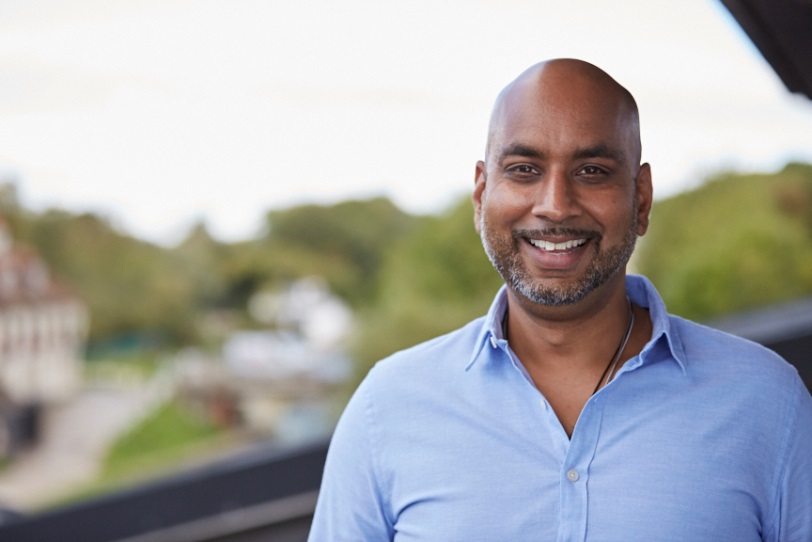The Stress Management Society
Interview with Neil Shah, by Nikki Roy, Body Mechanics
Stress and Mental Health are now more frequently talked about in the media as wellbeing issues we need to manage personally to stay healthy. But what if the issue is much broader than this? How can stress and mental health be managed by our Government, the NHS, the workplace and wider society adopting a preemptive approach, rather than a retrospective one.
Here, Neil talks to us about his experience of stress and mental health, what stress is and how it impacts us all as individuals and as members of society, as well as offering some practical stress management resources.
1.Why did you set up The Stress Management Society and what do you do?
In 2003 I had a personal experience with my mental health, which resulted in what was described at the time, as a breakdown. I actually now describe it more as a breakthrough. At the depths of that I didn’t actually want to be here anymore. The emotional and mental pain was so great, that I was happy to end my life.
My back story is, I started my first business at 24. I turned it into an international success, a multimillion pound business and then basically crashed and lost everything. That's why I had the breakdown.
I realised that the experience I’d had wasn’t a tragedy, it was actually the greatest gift I’ve ever been given. It was up to me to decide what to do with that gift.
There really wasn’t much to support a young person going through that kind of mental health challenge. No one was really taking the time to understand what I was going through. So I decided to do something about it. I set up The Stress Management Society, to offer support to people that are suffering from mental health challenges. Essentially inspiring and empowering them to do something about it.
We set up a research and consultancy organisation called International Wellbeing Insights, which goes into corporate organisations, to deliver mental health and wellbeing programmes, which in turn advanced all our non-commercial activity.
The sad statistic is that in W.E.I.R.D countries - western, educated, industrialised, rich and democratic - suicide is the main cause of death of men under the age of 45 and is rapidly becoming the same for those aged 15-29. It’s astonishing that even children under ten are having suicide thoughts and sadly many have followed through on those thoughts. It’s tragic. We are literally failing some of the most vulnerable members of our society. We have some serious societal failings where we don’t have the necessary support, and it's sad that lives lost to mental health don’t seem to matter as much as those lost to Covid.
Even with the support and right resources, it's not necessarily going to stop things; we can minimise, but we can’t stop it. With everything that’s been going on in the past two years things are getting worse, they’re not getting better.
Neil Shah
Chief De-Stressing Officer
- International Speaker
- Stress Management/ Wellbeing expert
- Management Consultant
- Executive Coach
- Master Trainer
- Best Selling Author
- World’s Top 30 NLP Professionals

2. How do you define stress? Common symptoms? How important is it to manage stress effectively?
When we came into existence, there didn’t seem to be a universal, commonly accepted definition of stress, which is a little bit challenging, because if the experts don’t necessarily agree, we’ll struggle with the general kind of labelling.
It was actually a chance discussion I had on a plane, with a Structural Engineer, a stress tester, who knew a lot about stress as a force in physics, as opposed to something that is a human experience. But what I found fascinating was that there was really quite a lot of crossover. I asked him what his definition of stress was and he told me Force over Area equals Pressure.
He said if you put enough load on bridges they will eventually collapse, but before it collapses you will know that it's not coping particularly well, because it will start to bow, buckle and creak. When it's giving us those signs, we’ve then got some choices around what we can do to stop it from collapsing. We can start to take some of that load off, or we can better support it using concrete blocks underneath the bridge to help it bear the load more effectively.
My immediate reaction was, hang on a minute, people are exactly the same. It doesn’t matter how mentally tough or resilient you are, every single one of us, if enough demand is placed on us, we too ultimately collapse. And before we collapse, we’ll know we’re struggling because we show those bowing, buckling, creaking signs through changes in behaviour and emotions. It's then that we have options to actually do something about it.
So our definition of stress is where demand exceeds resources. Where the demand placed on the individual exceeds their capacity or their ability to cope with that demand, or more simply put, when the bridge has got too much load on it.
The reason we developed that kind of language is because it very much appeals to the ‘masculine mind’ of structure, logic, process, solution and focus. The masculine mind doesn’t really deal well with emotions. It allows us to have emotion based conversations in a very visual and practical way, which makes it more accessible particularly when people find it hard to tap into their emotions.
Someone saying I feel depressed can be viewed as a sign of weakness, but approaching the subject from the view that the bridge is overloaded, what do I need to either strengthen it or to remove the load, gets easier for people to kind of engage in those conversations. It’s a commonsense foundation of discussion (Final sentence added in by Nikki Roy as a comment she made during the interview).
About Neil
Neil Shah is the founder of International Wellbeing Insights and Chief De-Stressing Officer of The Stress Management Society.
A leading international expert on stress management and wellbeing, he is the author of Amazon #1 best-seller ‘Turning Negatives into Positives – An Introduction to Neurolinguistic Programming’ and ‘The 10-Step Stress Solution’
He is a renowned media personality on the subject of wellbeing, appearing regularly on BBC Breakfast, BBC Five Live and Sky Sunrise.
3. How can individuals help themselves with stress management and with achieving/maintaining good mental health?
It's not a one size fits all solution. If we go back to the bridge analogy, what options do we have to remove some of the load and how can we better equip ourselves.
One of the key things is getting the basics right and that includes things like what are you consuming both physically and mentally. Are you consuming information that is inspiring and uplifting you? Do you live your life in the past or the future?
We have no control over past or future events, so being present actually allows us to consider really how best we can navigate the experiences that we’re having. Reflect and look for things that are worthy to be grateful for - they are there in every given moment of every given day.
At the moment, the thing I think we really need to focus on is the sense of community. There is a direct correlation over the last 40 years, that as society and community have degraded, issues around mental health have increased. We don’t operate as a society anymore. We don’t have this community. We have this consumer culture that has really focused on the individual. You don’t need to rely on a person or a group to be able to function. That individualism is creating a sense of isolation.
I think we need to start moving away from this notion that mental health is an individual issue. Mental health is a societal issue. If someone has a breakdown, or takes their own life, that is not their issue, that’s a societal failing. We are creating the circumstances where that individual wasn’t supported.
Our focus for Stress Awareness Month this year, is building #Community as we are #BetterTogether. When we can build empathy and can start to see the world through each other's eyes and learn how to be compassionate, we can come together to find common solutions for societal challenges. We don’t need more polarity fuelled by profanity, we need to find unity through the power of community.

4. On your website, you've agreed with the principle that 'business leaders should drive change' - why and how?
The business community and business leaders have a vested interest in the solution around wellbeing, because there’s a direct correlation between happy, healthy staff and high productivity, performance and success. A good company to work for happens to be a successful company.
It also has a snowball effect because it impacts employees' families and therefore their communities. Company competitors, partners and suppliers suddenly start to pay attention. This is how we start to create ripples of positive change across society, by role modelling it.
Our campaign for this month is ‘Proactive not Reactive’.
We need to start getting more proactive around community building, wellbeing, inclusivity, diversity and engagement, and to move away from being reactive.
There’s significanly more chance of the suicide of someone close to you, than there is of them dying due to war or human violence, yet we don’t talk about it, we don’t understand the scale of the issue. We’ve let it get to the point where the main cause of death for a man aged 45 in Western society is suicide and even though that’s the case, we’re still not doing anything about it really. That’s absolutely tragic. 14.3% of all human beings who die every year, die as a result of their own hand. That’s incredible.
5. What do you mean by 'meaningful employment'? How do you help organisations achieve this?
Your work is a crucial part of your wellbeing. Having meaningful, gainful employment will actually contribute to your wellbeing.
To me, meaningful employment is where you’re valued as a human being, you’re able to develop and contribute your skills in a way that enhances your employer's overall vision, and you are rewarded fairly for it. This is really where organisations need to consider is their profit to the detriment of people or do we have a balance? This is really what we should be considering because this is good for everybody.

6. What projects/initiatives are you currently working on?
Right now, we’re really trying to emphasise this message of community. I’m talking about where you start to understand that collectively, we have far more things in common than the things that separate us. So we’re helping to bring people together to share their experiences and to build this community, from a local to a global level.
Also another project we’re working on is through our charitable arm, we’re currently raising money and we’ve received some lottery money, to run programmes for youths and children, particularly 11-19 year olds.
We just started a project with Charlton Athletic football club called Level Up, to equip kids with the tools that they should
be taught at schools - personal resilience, managing their wellbeing, really understanding how to equip themselves with the skills, tools and confidence to be able to navigate this world that we find ourselves in.
The other one is a Mental Wellbeing Ambassadors Programme. A proactive approach where it shows you how to have those preemptive conversations, not to wait until someone’s bridge is about to collapse, but to be able to pick it up before the bowing and buckling stage, knowing how to engage them and how to refer them to the most appropriate support resources.
7. What is the '10 Step Stress Solution?'
Neil has written two books that can help you with stress management, click on the links below to find out more.
8. What changes have you seen towards addressing stress and mental health as a wellbeing issue?
We’re getting to a point where we’re more comfortable having this conversation. When Covid hit, mental health was sidelined. We’re slowly starting to see that come back up again, but it's put back the mental health progress back by 6 years. We’re back to where we were in 2016. And that for me is a real concern. Mental health didn’t just go away, because Covid came along, it actually got worse, so why have we stopped talking about it? Getting access to a Counsellor or someone on the NHS is next to impossible right now. I think it's going to take something quite prominent to put it back in our focus again. It shouldn’t take that.
9. Can you recommend any practical or insightul resources people can access to help with stress management?
Here is a link to my recommended resources: https://www.stress.org.uk/national-stress-awareness-month
Find out more and get involved...
Sign up to our newsletter
https://www.stress.org.uk/sign-up-to-our-stress-busting-newsletter/
The Stress Management Society Head Office: Suite C, Quay West, Salamander Quay, Harefield Middx, UB9 6NZ, UK.
Tel: 020 3371 3219
Email: info@stress.org.uk
Follow us on Social Media
Instagram : @thestressmanagementsociety
Facebook: @TheStressManagementSociety
Twitter: @StressMgtSoc

